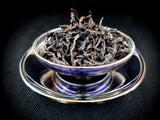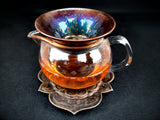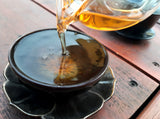This tea has been cultivated since the Qing Dynasty. Its leaves are long and slender, and it is named for carrying the distinctive aroma of plums and plum blossoms. Mei Zhan is one of the classic Cliff Teas, or Rock Teas, of the Wuyi Mountains. This is actually the tea that was bred to produce the famous Golden Horse's Eyebrow (Jin Jun Mei). While this style originated in Anxi, this particular Mei Zhan was grown beside the banks of the Nine Bends River in the Wuyi Mountains.
Dry its leaves carry a roasted, piney aroma, reminiscent of roasted bark. Wet, its smell is warming, dark, and roasted. It produces a silky, honey-colored brew with characteristic plum fragrance and a flavor that is sweet, earthy, robust, and savory. Its flavor is beautifully balanced, with flavors of wood all and hint of orchids. It has then stone-like yan yun flavor that is characteristic of good Cliff Teas. It makes the mouth water and leaves a sweetness on the tongue and in the mouth (huitian).
This tea is relaxing, yet mildly stimulating, harmonizing and smoothing the flow of qi, leaving one calm, yet awake, with a warm, tingly buzz.
Lasts about 8 brews.
This tea is highly suitable for aging. Over the years, its flavor will settle, its plum elements will become more pronounced. Aged Mei Zhan is incredibly relaxing, and leaves a clear yun granite and rainwater sweetness lingering on the throat. To drink hundred year old Mei Zhan is a rare treasure of an experience.
Nomenclature: The Chinese name of this tea is 梅占.
梅 - Méi - Plum, prune. The left side of this character (木) means "tree," giving a hint to its meaning. It is common to find this component in plant names. The right side of the character (每) is pronounced "měi." This component is phonetic. Many characters will take this form, with one half (typically the left) relating to the meaning, while the other half (typically the right) relates to its pronunciation.
占 - Zhàn - To divine, observe, or occupy.
There is a story that explains this name:
According to the legend, there was once an old couple who lived in Anxi, who toiled ceaselessly to cultivate land that had been reclaimed. This couple were devout Buddhists, and well known for their generosity. Through perseverance and hard work, they eventually because successful, their wealth never outpacing their generosity, but felt poor, in that they had no children.
One day, a monk was passing through town. The couple, generous as they were, offered the monk food and a place to stay for the night. The monk could see the couple's sadness, and, as they were talking, asked its reason. The couple, hoping that this monk might have some helpful advice, shared the reason for their sadness. Though he gave them no advice, the couple felt hopeful after the monk departed, and headed up Tiger Ridge the next day to look for tea. There, they saw two beautiful tea trees atop the ridge, illuminated by the morning sun.
After making tea with the leaves from these trees, the couple grew healthy and strong, and gave birth to their first child the following year.
To celebrate, they invited the townspeople to a great banquet, where the couple gave out seeds from these exquisite tea trees. The other villagers, upon drinking the tea and hearing the story, all wanted to know the name of the tea. The couple told them it had no name yet, as it had been discovered by providence.
While some suggested catchy names like "Immortal Buddha," the local scholar suggested that they call the tea "Mei Zhan," after the old Chinese saying:
“春为一岁首,梅占百花魁。”
”Chūn wéi yī suì shǒu, měi zhàn bǎi huā kuí. “
Meaning:
"Just as Spring is the head of the year, amongst the hundred flowers, the plum occupies first place."
Thus, this name was chosen, not only as a compliment to the tea, but as an auspice that the couple's descendants would continue to flourish and multiply.





